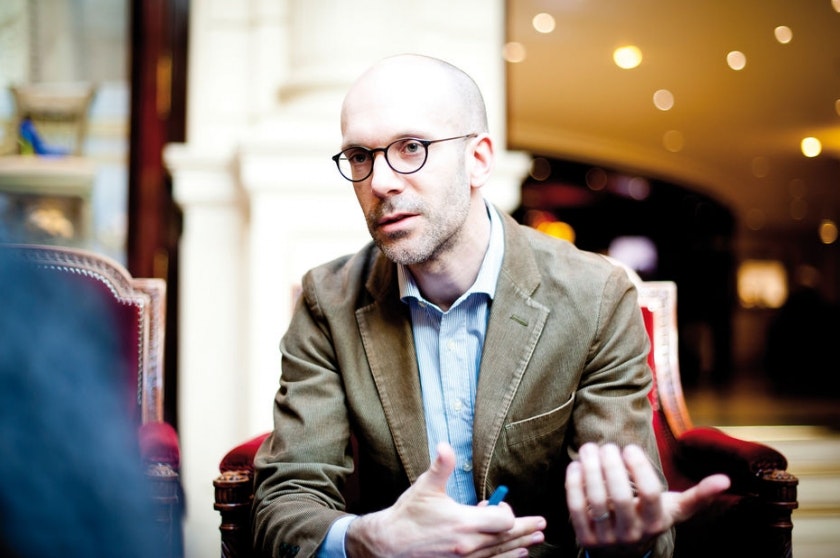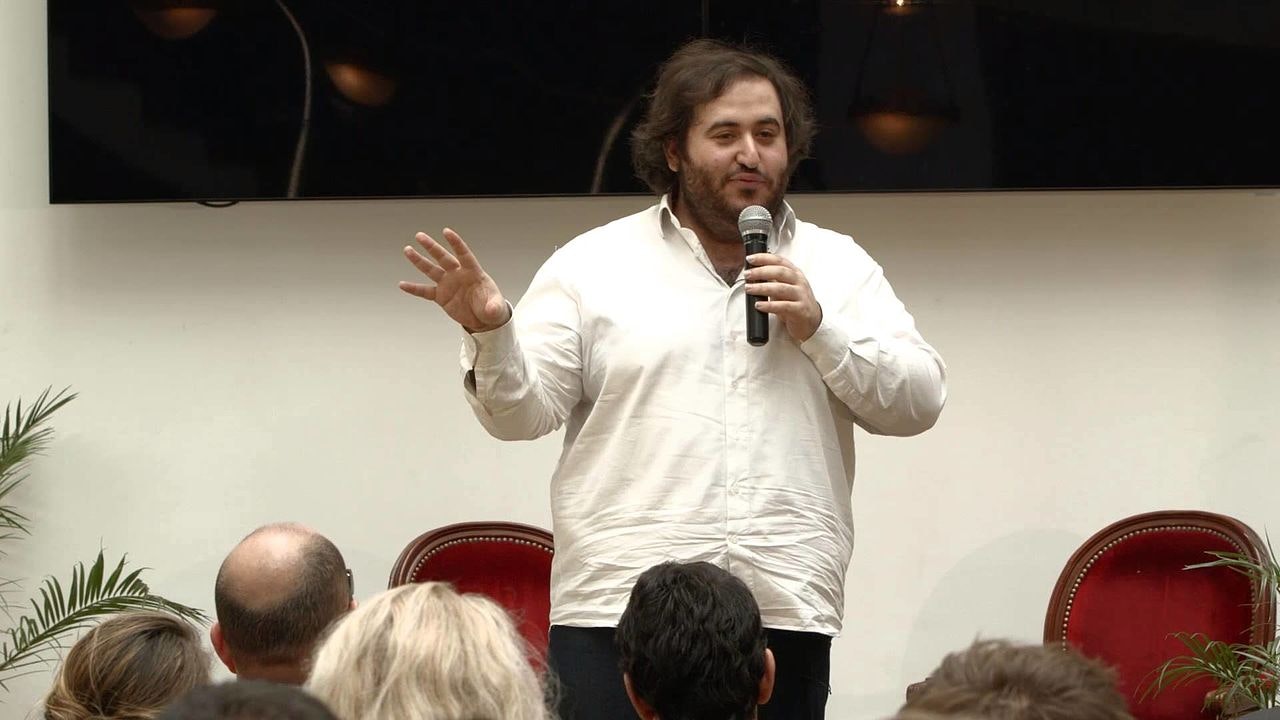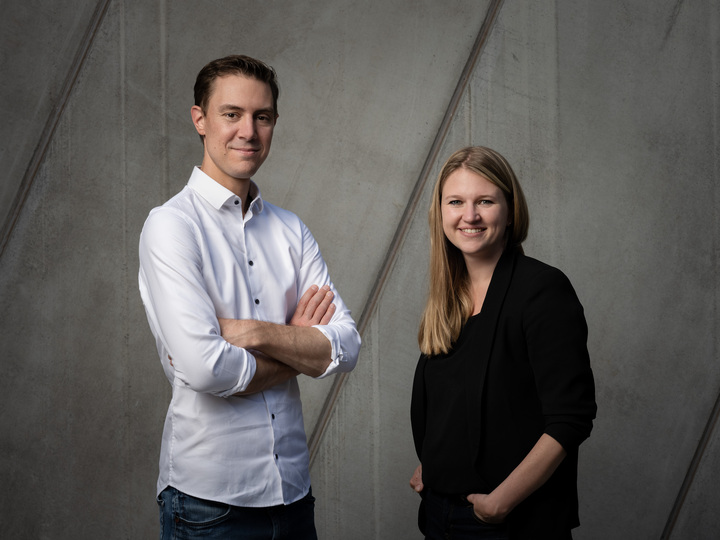For the past two years, The Family — one of France’s most influential startup organisations — and one of its cofounders, Oussama Ammar, have been embroiled in one of French tech’s ugliest startup fights.
Across multiple legal proceedings opened in France, the UK and the Cayman Islands, The Family accuses Ammar, who left the company in 2022, of having embezzled millions from the organisation and its investors.
A large part of the money, The Family claims, was used to build Le Petit Manoir, a residence at the luxury Normandy countryside hotel Le Domaine d’Ablon — which is now under threat of destruction.
Ammar denies these accusations and says the procedures against him are “abusive”. “I’ve made many settlement offers that they refused,” he told Sifted in an interview in June. “It’s not a story about money, but about ego, divorce, and emotions.”
Despite the controversy, Ammar is planning his comeback to French tech. A few weeks ago, he announced a new startup accelerator, The Labyrinth; he says it is set to launch this October, and that 20 startups have already been selected.
But recent developments have not gone Ammar’s way. In July, a court in the UK authorised The Family to enter judgment against Ammar and scheduled a hearing to determine the exact damages he should pay to the organisation.
Then in August, a court in the Cayman Islands rejected a claim from Ammar, in which he questioned the legitimacy of a legal case that resulted in an earlier court order for him to pay €7.3m in damages to The Family. The latest ruling could lead to some of his assets being seized; Ammar says that he is appealing the decision.
Ammar has pledged to “keep fighting” and says that he will “counter-attack” to claim money that he says he is owed by his former cofounders — an allegation that The Family denies.
What happened with The Family?
The Family was launched in 2013 by Ammar, along with cofounders Nicolas Colin and Alice Zagury.
It quickly became one of France’s most famous startup incubators, organising events and offering educational courses for founders. Over time, it also created a number of investment vehicles to allow investors around the globe to pool their money to back specific startups, including notable unicorns like PayFit and Algolia.
Shortly after Ammar left in 2022, a legal procedure was launched in the Cayman Islands by The Family, which accused Ammar of having embezzled, via several investment vehicles and through unauthorised payments, nearly €3.5m that was intended to back six high-profile companies including Stripe, Airbnb and SpaceX.
At the same time, the court issued a freezing order against Ammar: €3m of his assets in the Cayman Islands were effectively ‘frozen’, meaning that he was banned from moving them elsewhere or disposing of them.
Ammar tells Sifted that the accusations against him are false, and says the transactions reflected The Family’s way of operating. “These transactions were all made from the accounts of The Family and validated by the financial and legal services, for years,” he says.
“Any serious entrepreneur knows that the line between personal and professional funds is unclear, and that Nicolas [Colin] is applying with rigidity a unilateral reading that is in his favour.”
Ammar’s former cofounder Colin refutes that this was the case. “Extensive evidence across all legal proceedings demonstrates that none of the transactions in question were properly documented or validated,” he tells Sifted.
“It speaks volumes that a purported educator and investor would suggest that entrepreneurs should deliberately mix company and investors' funds with their own, and then hope to evade accountability.”

Proceedings in the Cayman Islands
Publicly available court documents from the Cayman Islands state that Ammar did not participate in the legal proceedings and a default judgment was made against him in 2022.
Last December, the court issued its final decision that Ammar had misappropriated the funds, and ordered that he pay €7.3m to The Family — accounting for the loss of funds and the loss of profit caused by the failure to invest the money.
According to recently released court documents, first steps were taken by The Family to enforce the order in Delaware, where Ammar has assets. In March 2024, Ammar then opened a new case in the Cayman Islands to challenge the legitimacy of the entire procedure and invalidate the judgment. He also raised procedural issues, arguing that the freezing order had prevented him from hiring lawyers to defend himself.
But the documents show that at the end of July, the court ruled against Ammar again and confirmed the initial judgment. Ammar told Sifted that he is appealing the decision.
“Now that his tardy jurisdictional challenge has been ruled as an abuse of process in the most striking terms, enforcement efforts will resume swiftly,” Ammar’s former cofounder Colin told Sifted in August.
Colin previously told Sifted in June that proceedings had started to seize some of Ammar’s assets in Delaware, and would soon begin in France too.
Ammar says that this requires judges in these localities to recognise the judgment issued by the court in the Cayman Islands. “We will keep fighting to make sure that the judgment is not recognised,” he tells Sifted. “The next step is in front of the French court.”
Proceedings in the UK
The Family also opened a case against Ammar in the UK in 2022. According to a draft court document seen by Sifted, the organisation accuses Ammar of having misappropriated another €2.4m and seeks over €9.5m in damages from the ex co-founder. Colin confirmed these claims to Sifted.
A letter sent by Ammar’s lawyer to the court earlier this year, which was shared publicly by Ammar, states that the damages claimed by The Family exceeds the amount of his total assets, and offers to settle the case by transferring “almost everything which Mr Ammar owns”. The letter clarifies that the offer is not an admission of liability or wrongdoing.
But documents seen by Sifted show that after Ammar failed to comply with several court orders, the UK court issued a ruling in July to strike out the ex-cofounder from the proceedings, and open the way for a judgment to be made in favour of The Family. A hearing has been scheduled this October to determine the exact amount of damages that Ammar will be ordered to pay to the organisation.
The court has therefore “ruled on [Ammar’s] liability,” according to Colin.
“Money is obviously more important than reason in this system,” Ammar tells Sifted. “I don’t have enough funds in the short-term. But I have no doubts that I will revert all this in the long-term by becoming very rich and getting revenge on all these abusive procedures.”

Le Petit Manoir
There are also several civil proceedings underway in France that concern Le Petit Manoir — the cottage built by Ammar at Domaine d’Ablon, a luxury hotel in Normandy.
In 2022, The Family opened a case in a French commercial court claiming that Ammar, via his company Thelema, had used a large part of the money diverted from the organisation to fund the construction of Le Petit Manoir, and requested that the court appoint a provisional administrator to manage Thelema while investigations were on-going. Ammar denies these allegations.
Documents seen by Sifted show that in June 2023, the court found that there wasn’t enough evidence, at that point, to show that Ammar had misappropriated funds from The Family, and ruled against the organisation's request.
A few months later, in October 2023, another French commercial court found that Ammar had used €50k in funds from The Family to pay a construction company involved in building Le Petit Manoir, and ordered him to pay the sum back to the organisation. Ammar has appealed the decision.
Le Petit Manoir remains an asset of interest to The Family. Colin tells Sifted that the building will be targeted for recovery “once the Cayman or English judgments are enforceable in France”.
However, in 2022, the local council in Normandy claimed that Le Petit Manoir was built without the appropriate permits, and has ordered that the plot of land be returned to its original state — effectively meaning that the building could be destroyed. Ammar says that he has appealed this.
Colin says that this puts a big question mark on the actual value of Le Petit Manoir. “It is uncertain whether it still holds substantial value,” he tells Sifted.
The settlement offer that Ammar made and shared online included Le Petit Manoir and shares that Ammar owns in Domaine d’Ablon. Given the uncertainty around their value, says Colin, The Family refused the deal.
“None of the assets in play was properly documented, their value was highly uncertain, and some, such as the Petit Manoir and the Domaine d’Ablon in general, were clearly distressed and worth significantly less than claimed in the proposal,” says Colin.
”The only viable option was to reject the proposal as unsatisfactory.”
“If this is the case, why are [The Family] still wanting to seize these assets?” says Ammar.
Ammar’s come-back
Ammar, now based in Dubai, has recently announced that he is “returning to the startup game in Paris” with the launch of a new accelerator for “misfits” dubbed ‘The Labyrinth’.
“The [French] ecosystem is exploding but there is no diversity,” he tells Sifted. “That’s a shame, because misfits and pirates are an inexhaustible source of entrepreneurship.”
Founders and VCs had a mixed reaction to The Labyrinth. Comments underneath Ammar’s post range from a founder asking if the post is a joke, to another one enquiring where they can sign up.
But Ammar says that interest is high and that he has secured 20 startups already; he is planning to launch the accelerator’s first batch in October.
Ammar also announced in June that he is launching a litigation fund. He is hoping to raise at least €1m to launch procedures against The Family, which he says owes him carried interest and bonuses from the time he spent with the organisation.
“No [entity of The Family] owes anything to Oussama Ammar or his companies,” says Colin.
Up to 1.8k people have said they would participate in the fundraise, says Ammar, although it is unclear how much they will commit.
“No comment,” Colin tells Sifted, “except perhaps to hope that this won’t be an instance of numerous credulous investors committing funds to a lost cause.”
Colin and Zagury are still managing The Family’s portfolio — but aren’t actively investing.
“The pandemic, followed by Oussama’s wrongdoings, dealt a heavy blow to [our] approach, which hasn’t been revived to this day — and obviously can’t as long as legal proceedings are ongoing,” says Colin.
The organisation is now focusing on managing the shares it still holds in dozens of companies while stabilising its finances. It was last reported in 2023 that the Family had stakes in 120 companies, now valued at about €40m. Colin declined to confirm how many companies the organisation now has stakes in, or the latest valuation of its portfolio.



